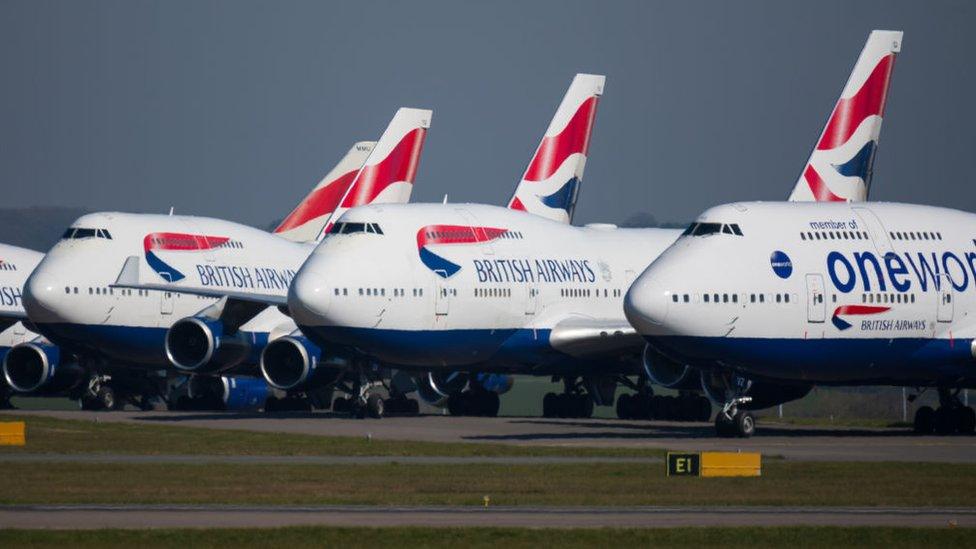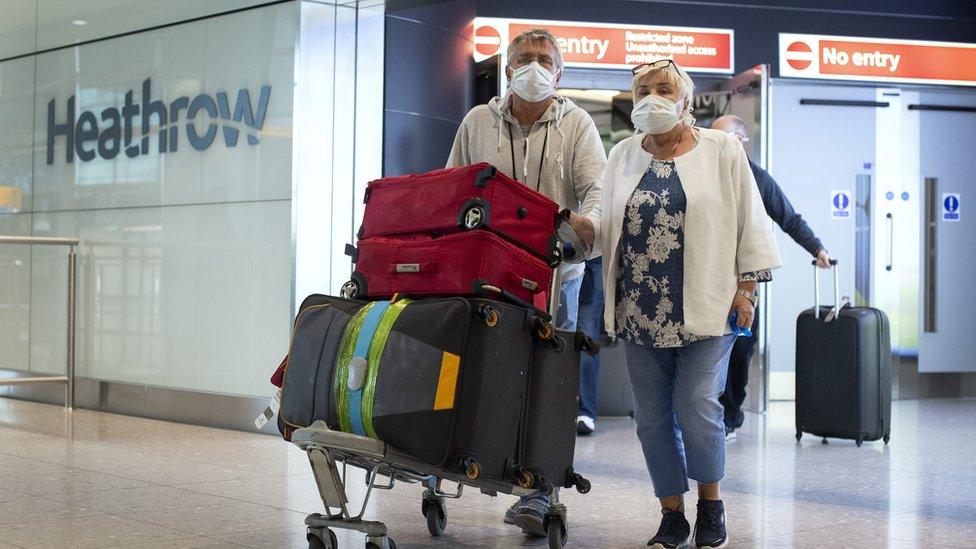BA 'dismissal threat' undermines talks, pilots' union Balpa says
- Published

The pilots' union Balpa has accused British Airways of undermining talks over proposed job losses by threatening to dismiss and re-hire its members under new contracts.
The airline proposes to make 12,000 staff redundant, as it struggles with the impact of the pandemic, with more than 1,000 pilot roles at risk.
British Airways said it was acting now to protect as many jobs possible.
It insisted no final decision had been made.
Balpa has been meeting with the company, unlike some unions, including Unite and GMB, which BA says have refused to enter talks.
But Balpa general secretary Brian Strutton said on Saturday night that those talks now hung "by a thread".
"Balpa reps have been in consultation with BA over its proposed 1,130 pilot job losses and we've been doing that constructively and in good faith," Mr Strutton said in a statement.
"Then, on Wednesday evening, a letter from BA added another 125 job losses and also for the first time threatened all 4,300 BA pilots with dismissal and reengagement if we did not reach agreement on changes to terms and conditions.
"I'm appalled at the cavalier attitude shown by BA towards the Balpa reps and to its pilots.
"This has seriously undermined our talks which now hang by a thread."
Willie Walsh, the chief executive of BA's parent company IAG, emphasized this week in a letter to Parliament that no decision had been made in relation to actual redundancies.
"There are some who believe the company is exaggerating the scale of the challenge," Mr Walsh said in the letter. "Nothing could be further from the truth. The situation is unprecedented."
Quarantine row
British Airways said it was acting now to protect as many jobs possible, as the airline industry faced the deepest structural change in its history. It called on Unite and the GMB to consult with it on its proposals as Balpa was doing.
Separately, BA, Easyjet and Ryanair have made inroads towards a legal challenge to the government's plan to impose two weeks' quarantine on travellers entering, or returning to, the UK.
The three have written a letter to Procurator General Sir Jonathan Jones, the government's most senior legal official.
In it, they argue the rules for incoming travellers will be more stringent than those for people who are actually diagnosed as having coronavirus - and point out that the rules are governed by different legislation for residents of Scotland, Northern Ireland and Wales.
The proposals have been roundly criticised across the travel industry. The Home Office has said it believes the measures will help stop the spread of the virus.
A government spokesperson said: "As we get the virus under control here, we must manage the risk of cases being imported from abroad.
"These measures are informed by science, backed by the public and will keep us all safe.
"We recognise it is a difficult time for the travel industry, and the government continues to work with industry partners to ensure these measures remain effective and necessary."
The boss of Getlink - formerly Groupe Eurotunnel - has also written to the government, criticising the plan for its burden of paperwork, for instance the efforts that would be needed to keep track of workers who cross the channel frequently.
"The exemption to quarantine for staff who cross the Channel many times a day, within the concession, turns out to be an administrative burden for each crossing that will require much time to set up and deliver," wrote Getlink's chief executive Jacques Gounon.
He also complained to Prime Minister Boris Johnson about the speed of the new rules.
"Limited consultation by the Home Office and departmental intransigence have led to a situation that puts a serious risk on the efficiency of operations at the Channel Tunnel, a vital link in the Great British supply chain," he wrote.

SCHOOLS: When will children be returning?
EXERCISE: What are the guidelines on getting out?
THE R NUMBER: What it means and why it matters
AIR TRAVELLERS: The new quarantine rules
LOOK-UP TOOL: How many cases in your area?

- Published5 June 2020

- Published11 May 2020

- Published4 June 2020
